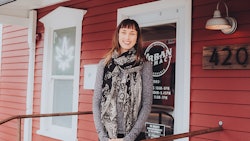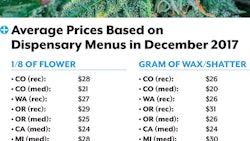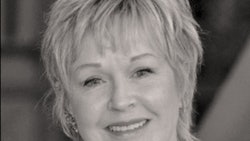
Go into a dispensary in each of the country’s adult-use states, and you will likely have very different purchasing experiences. This is to be expected, given the industry’s nascent stage and the fact that each state established the rules and regulations that govern its adult-use market. For example, Oregon budtenders can weigh and package flower in front of customers. Washington requires that products be pre-packaged into specific quantities.
Cannabis Dispensary connected Origins Cannabis, a recreational and medically endorsed dispensary with locations in Redmond and Seattle, Wash., with Jayne, a medical and recreational dispensary in Portland, Ore., to learn more about the similarities and differences of operating and competing in different state markets.
In this exclusive one-on-one interview, Origins Cannabis Product Curator Jon Sherman spoke with Jayne Owner Robb Arnold and General Manager Briana Burke about U.S. Attorney General Jeff Sessions’ decision to rescind the Cole memos, today’s industry trends, vendor selection, compliance and more.
Jon Sherman: How did you stomach the Jeff Sessions news, and is it a concern for you?
Robb Arnold: At first, I was really irritated because it’s another uncertainty in the industry. It seemed like it was going to have a little more effect, but I think it was just a blowhard move to appease his [supporters]. … It seems politically or corporately motivated. At the end of the day, it means absolutely nothing to our industry [as a whole]. It’s too big of a freeway to turn around at this point.
As a dispensary, I don’t want to be the low-hanging fruit with compliance. Those are the people that are going to have to worry about a possible fed-type situation—those who are not paying their taxes, not doing the right thing, not staying compliant. For most of us that are operating compliantly and doing our job, it shouldn’t be an issue.
“A lot of times people are not well-versed with the products that they're selling and can't answer questions, which doesn't put you up at the top of the list.” Briana Burke, store manager, Jayne
Sherman: I certainly wasn’t too struck by the news. It didn’t seem too ironic that three, four days after California flipped the switch that the statement was made. We look at doing things the right way, and compliance is the driver of everything for our business. We want to make sure that we don’t have targets on our backs, and we’re keeping up to snuff with taxes. So, in my mind it’s good. Let’s eliminate some of those unethical players so that we can really start to form this business and mold it into the way a business should be run.
Arnold: Being a product curator, what are you seeing trend-wise with products and the quality of products in Washington?
Sherman: I see product quality increasing significantly. When [Washington] first went legal, you had a lot of people that didn’t know how to quantify quality. They stooped to the lowest common denominator and used a THC number as the driving force and the metric that we should pay attention to. There were a lot of stores that sold based off THC. We had some issues with labs in our state … giving big gardens higher numbers so that they had more advantages in the marketplace because they were bigger accounts for the lab.
Origins … would not buy products from anybody that tested with certain labs. We partnered with one of the biggest labs in Washington State to develop a ratio system that we could use to create transparency for our customers by not going off the THC metric, but by a cannabinoid ratio, and to shift people away from indica, hybrid and sativa, because almost everything produced is a hybrid and everyone reacts differently.

Arnold: Do you think your consumers are getting smarter, too?
Sherman: Absolutely. That’s one of our three main metrics of business; we want to drive education. It costs money and takes time, but that builds loyalty, and it challenges the stores around us. People are buying $59 or $69 ounces of [bad product]. That is going to get exposed, and we don’t want to play that game.
Arnold: We’re seeing the same thing. … The quality of [Oregon’s] products is getting better. Products are setting themselves apart through branding, quality and testing. [Oregon] had the same problem with labs.
Sherman: There’s a little bit of consolidation starting to occur. There [are] people going out of business every day. There [are] retailers that haven’t kept up on their federal taxes, and now the state’s looking at them going, "We’re not going to renew your license."
We need a true convergence of individuals that have business acumen, but also folks that have been in the space before, that have done their time in the medical market, that understand the plant and the science behind it, and understand the culture. That’s something we certainly can’t lose touch of.
Arnold: What’s your biggest challenge right now?
Sherman: Compliance and the ever-changing climate of the market. Our other biggest challenge is education. A lot of the people right now that are ultra-successful from a monetary standpoint are low-cost leaders, the ones that are selling a bunch of [low-quality product]. People that are taking advantage of growers that are failing by making bulk buys at insanely low prices.
Arnold: Are you experiencing a glut of marijuana in Washington? [Oregon is] in the midst of a huge glut, and prices have basically been cut in half from last year.
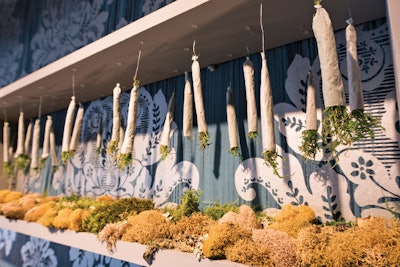
Arnold: How long do products or vendors stay on your menu?
Sherman: Our goal is 1.3 to 1.4 turns per month. But I’d say that we get about a turn a month. We’re not trying to buy over a 30-day supply.
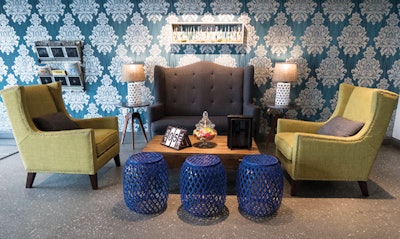
Jayne's waiting area makes customers feel right at home with its living room vibe.
Photo courtesy of Jayne
Preservation is important to me. All of our concentrates, all of our vape products go directly into wine fridges in all of our stores. We keep [them] at 55 degrees, no humidity and low light levels so that we can preserve the integrity of the product.
We also … position humidity packs into all our jars of our house-branded product. We’re running a campaign called "Don’t Buy Dry."
Since microbial levels are a big scare for growers, … they’ve been drying their product to where there’s little to no moisture. I like to be able to squeeze my bud and feel that flex and feel those nice resin heads stick to my fingers versus something that I pinch, and it explodes into dust.
Briana Burke: How do you deal with quality control when your flower products are prepackaged before it goes to the consumer?
Sherman: Our slogan is "hand-selected.” We want to spend time going to the actual gardens, putting our faces in the turkey bags, putting gloves on, looking at the product and evaluating it there and not based on its potency level. We allocate a budget for third-party testing. Every quarter we do test-site screenings on all our gardens.
“We need a true convergence of individuals that have business acumen, but also folks that have been in the space before, that have done their time in the medical market, that understand the plant and the science behind it, and understand the culture.” Jon Sherman, product curator, Origins Cannabis
It’s strengthened relationships. It’s proven to growers that we go that extra mile, and it translates to them putting better product in our jars. It’s a tighter bond versus playing the price game and always beating up people for cheaper product and better quality.
Sherman: You have the ability to grow your own product, put it in jars and bag it for your customers onsite. What are the wins and losses of doing it that way?

Arnold: We do everything deli-style with flower. I have held onto that tightly because I think that’s a better experience for the customer. It’s a little more time-consuming from a budtender point of view to weigh that stuff out. But the customer [is] able to look [at] and smell the product, and get an idea of the quality. The budtender can walk them through all the different points of a certain grower and different points of the quality.
Sherman: How do you select your vendors?
Burke: What we look for from a vendor, whether it’s flower or edibles or cartridges, is who they are, how long have they been around and what labs they use for testing. Oregon has standardized testing for all our cannabis labs. We have some of the most stringent pesticide analysis in the country for flower. It’s a little comfort when talking to vendors, but there [are] a lot of other things we have to be aware of, like how they deal with moisture and environments where mold could grow. So, the quality that they produce, the consistency, the reputation within the industry, how well they brand themselves and what pricing they’re willing to work with are usually the keynotes.
Arnold: There’s a lot of vendors out there. Having a good story behind them, having them be on time, having them be professional, there’s a lot of other factors besides just the quality of their product.
Burke: A lot of times, people are not well-versed with the products that they’re selling and can’t answer questions, which doesn’t put [them] at the top of the list. We found that mainly with reps that worked for bigger grows that were salespeople, but had no knowledge of what nutrients were in the soil. Making sure a vendor knows their product is helpful.
Sherman: We have a similar process. It’s a new vendor-intake form we require them to fill out before they bring me samples and before there’s any kind of an interview. It’s been extremely helpful. Fifty percent don’t take the time to fill it out. That weeds out half the people right there, which is great.
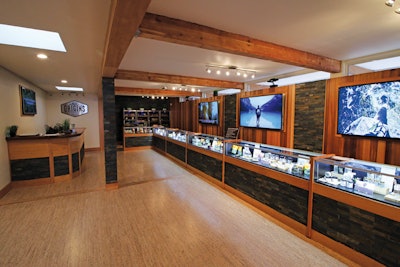
Sherman: What are some red flags when you’re interviewing a potential new partner?
Arnold: The first thing I look for is: What’s the impression of this person walking through the door? Were they on time? Were they prepared? Are they organized? I’m looking them up and down and making a predetermination. I’ve had people be very good that didn’t give a good first impression, but most people that give a bad first impression remain bad.
I’m a handshake guy. I need to trust the person on the other side, and if you’re a sleazy salesman or you don’t know your product, I’m proceeding with caution.
Burke: On average with cartridge returns, do you see a 5-percent rate, or is it less?
Sherman: It’s probably upwards of that. There’s been a steady decline as we’ve seen the technology start to develop. We’re noticing that month over month our returns are dropping significantly, so it’s promising knowing that there’s a good amount of innovation that’s taking place.
“We’re in such a competitive market ... that growing or scaling up your grow to fit what you can sell, as opposed to trying to dump that product on other dispensaries, makes a lot of sense.” Robb Arnold, owner, Jayne
Sherman: You all are starting to become vertically integrated, correct?
Arnold: We haven’t grown a crop to get into our shop yet. But [being vertically integrated] helps a little with navigating 280E from a farm perspective as opposed to a dispensary perspective. We’re in such a competitive market … that growing or scaling up your grow to fit what you can sell, as opposed to trying to dump that product on other dispensaries, makes a lot of sense. We’re looking at scaling up our grow according to our business as opposed to mass-producing it.
We’ve got a good farm right now, a piece of property that we’re working with that I’m hoping we’ll turn into a bed-and-breakfast cannabis retreat that gives a traveler a different experience where they can see the whole farm and the product from start to finish.










